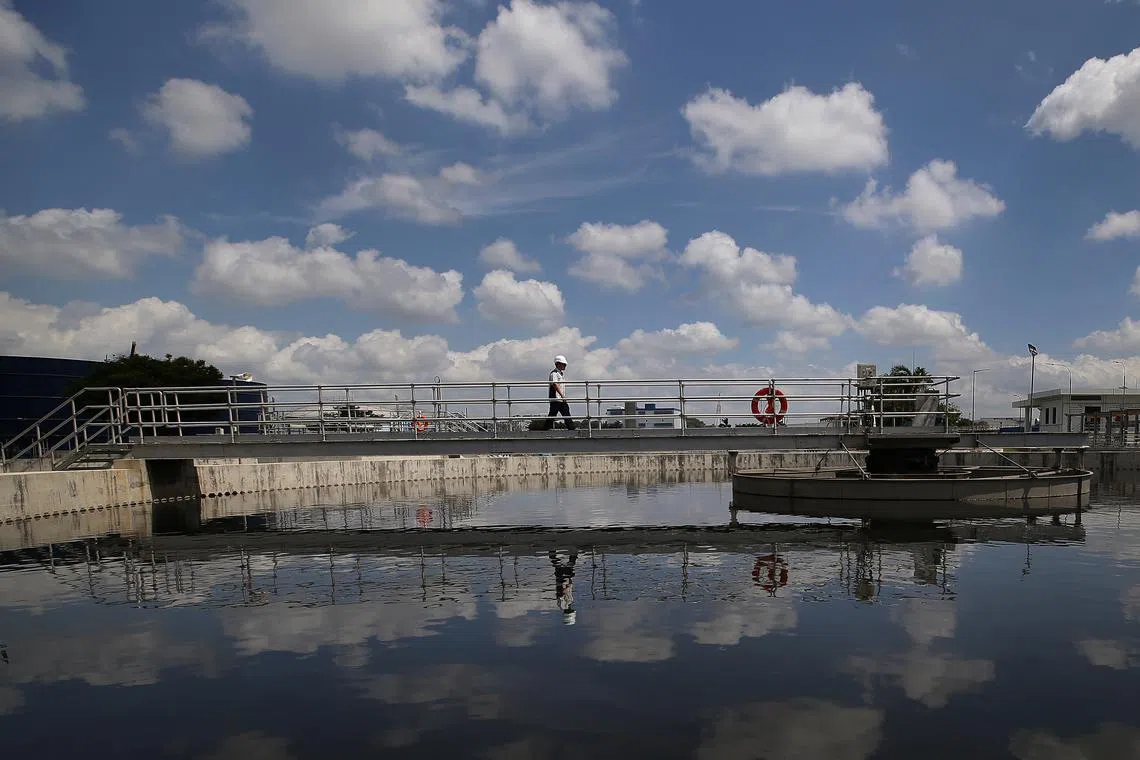Water recycling requirements to be mandated for water-intensive industries: Grace Fu
Sign up now: Get ST's newsletters delivered to your inbox

Recycling water can help companies by reducing their water bills and contribute to their long-term competitiveness.
PHOTO: ST FILE
Follow topic:
SINGAPORE - To help reduce water consumption in water-intensive industries, PUB will be mandating recycling requirements for new projects in these sectors from Jan 1, 2024.
These include projects in the wafer fabrication, electronics and biomedical industries, which account for about 17 per cent of non-domestic water demand, Minister for Sustainability and the Environment Grace Fu said on Thursday.
The national water agency said that with Singapore consuming about 440 million gallons of water per day and total water demand expected to almost double by 2065, recycling water can help companies by reducing their water bills and contributing to their long-term competitiveness.
PUB added that a major source of water demand growth is expected to come from the non-domestic sector, where it is projected to increase from 55 per cent of total consumption currently to more than 60 per cent.
“There is also high potential for water recycling in these industries, as their used water streams can be effectively recycled when segregated at source. In addition, some waste water streams from the electronics and biomedical plants are fairly clean, making it easier to recycle with minimal treatment required,” it said.
Therefore, wafer fabrication plants involved in front-end semiconductor manufacturing, which consume at least 60,000 cubic meters of water annually, would have to recycle at least 50 per cent of their water consumption.
Likewise, electronic and biomedical plants which consume the same volume of water annually would be required to recycle their specified waste streams.
With these measures in place, PUB said, daily water savings could reach nine million gallons – equivalent to 15 Olympic-sized swimming pools – from 2035 onwards.
The agency has consulted companies from the affected industries, and said that the companies have found the new recycling requirements to be achievable for new projects.
The median water recycling rate among existing wafer fabrication plants stands at 43 per cent, PUB noted.
Companies looking to implement these water recycling projects can apply for financial support from PUB’s Water Efficiency Fund and the Industrial Water Solutions Demonstration Fund within the next two years, until the end of 2025.
PUB is also reviewing its funding framework and looking into providing more incentives for companies to achieve a recycling rate beyond the mandated 50 per cent level.
Details will be made available in the next few months.
The Kranji Water Reclamation Plant (WRP) and the Kranji Newater Factory will also be redeveloped, said Ms Fu.
This comes amid major upcoming residential and industrial developments in the north, such as Tengah New Town and Sungei Kadut Eco-District, which will significantly increase the demand for used water to be collected and treated.
PUB will be using more advanced treatment technologies that have better treatment and land-use efficiencies, which also have a smaller carbon footprint.
The new Kranji WRP will be connected to the Deep Tunnel Sewerage System (DTSS) – a network of deep tunnels that form a superhighway for Singapore’s used water – before reaching the water reclamation plants and the Newater factories.
The DTSS system would then have three nodes for water reclamation – the Kranji WRP in the north, the Changi WRP in the east and the Tuas WRP in the west. All three WRPs will be co-located with Newater factories.
“When completed, the DTSS will reduce by 50 per cent the amount of land that would otherwise have been needed for used water infrastructure, (which is) significant for land-scarce Singapore,” said Ms Fu.
“We are making good progress on DTSS Phase 2 and expect tunnelling works to be completed by the second half of this year. This will connect the existing Changi WRP and the upcoming Tuas WRP in the west,” she added.
The Tuas WRP will be completed by 2026,
PUB said that to reduce domestic water consumption, Singapore had in 2018 set a target of 130 litres per capita per day (LPCD) by 2030 but the Covid-19 pandemic had increased water consumption significantly, from 141 LPCD in 2019 to 154 LPCD in 2020 and 158 LPCD in 2021.
With the resumption of business activities and relaxation of safe management measures in April 2022, PUB said that household water consumption has decreased and reached 149 LPCD as at December 2022.
“PUB will continue to work towards the 130 LPCD target by 2030 and drive behavioural change among households to ensure a sustainable and resilient water supply for the future,” said the agency.


